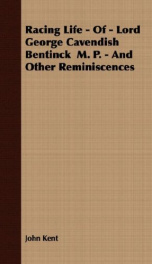PREFACE. IN May 1865 I returned to Englapd, after passing nine years, almost without intermission, in the United States of America. Shortly after my arrival in London, I inet an old friend now deceased who asked me to come and dine with him w day or two later at the Windham Club, in St Jainess Square. On repairing to that hospitable resort, I found that the only guest besides myself was the still living Ir Jaines Weatherby. Naturally I had much to ask hiin about the inciderlts connected with horse-racing which had happened since he and I last met, nine or ten years before. Among other questions, I inquired who was now the Dictator of the Turf. Since I last saw you, . Mr Weatherby replied, there have been two or three Dictators, such as Sir Joseph Hawley and Admiral Rous but from the day when I first knew the Turf, forty years ago, down to the present moment, it has had but one Dictator worthy of that name-I mean, of course, Lord George Bentinck. Jtr Weatherbys words revived in my mind a desire which had long before been conceived by me, to gather together materials for the Racing Life of Lord George Bentinck, who, above all other racing men within my memory, had left his mark most impressively upon the history of the British Turf. I had often enjoyed opportunities of conversing on this subject with Lord Georges old and trusted trainer, Mr John Kent, who, I was well aware, entertained the profoundest respect and regard for his memory. Not until within the last two or three years, however, has it been found possible for Mr Kent to write, or for me to edit, the notes on which this volume is based. Those who are interested in the subject, and have the patience to read this work, will, I hope, not proceed far without discerning that its hero, Lord George Bentinck, was undoubtedly the most remarkable man, and also the strongest character, that the British Turf has known or seen during the present century. It should therefore, I think, be a matter of general satisfaction to the vast army of followers and supporters to mhoin horse-racing is either an amusement or a profession, that Mr John Kent, whose health has long been far from strong, should not pass away without chronicling what he knows about the noble master whom he served so faithfully. Lord Georges active connection with the Turf, as a prominent actor thereupon, did not extend over more than fifteen or sixteen . years. There have, of course, been many conspicuous patrons of horseracing who have, in The Druids phrase, found pleasure in listening to the whistle of a racingjacket for a far longer period than Lord George was permitted to do. I believe, however, that between 1830 and 1846 Lord George did more to improve, and in some senses to revolutionise, the Turf, than all the other members of the Jockey Club who have lived during the present century. The following chapters will explain my meaning to those who know no more of Lord George Bentinck than that he passed away before their time, and to others-many of whom exist-who have not even heard his name. In preparing Mr Kents notes for publication, I have been surprised to find how completely the lapse of forty-four years, which have intervened since Lord Georges death, have obliterated all recollectioil of the most masterful and powerful personality known to racing men since the ...




